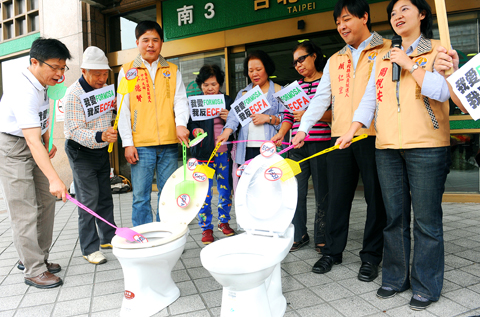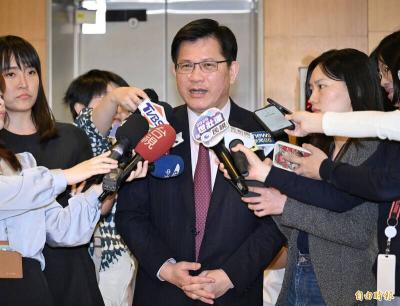The debate that will be held this weekend between President Ma Ying-jeou (馬英九) and Democratic Progressive Party Chairperson Tsai Ing-wen (蔡英文) on signing an economic cooperation framework agreement (ECFA) with China should be more than just about tariffs and free trade, the Taipei White-Collar Anti-ECFA Alliance said yesterday.
Dozens of members of the alliance yesterday called a press conference at the plaza in front of Taipei Main Station to express their views and gather signatures for an ECFA referendum. They also held a short skit in which they slapped two toilets with fly swatters to symbolize the urgent need for the Ma administration to awaken from its ECFA dreams.
“So far, discussion surrounding the signing of an ECFA with China has mostly been about weighing the costs and benefits for various industries and professions,” Alliance president and Taiwan Solidarity Union director Chou Ni-an (周倪安) said.

PHOTO: CHANG CHIA-MING
The Ma-Tsai debate would be “handicapped” if bigger and more important issues are not discussed, such as the social, political and cultural aspects of signing an ECFA, she said.
Chou was referring to the debate between Ma and Tsai on the signing of the free-trade agreement, which will be televised and is set to take place on Sunday afternoon.
The activists said that any agreement signed by the two countries would have a political impact on the cross-strait relationship and that if the government goes ahead with signing the agreement against the wishes of its people, it would lead to political clashes.
“Political, cultural and social issues are indispensable to the discussion of economic and trade issues,” Alliance director Chen Teh-hsien (陳德賢) said.
“If we only talk about economic costs and benefits without a discussion about the political, cultural and social aspects of negotiation between the two countries, we will cause ourselves greater harm than good,” he said.
Chen also proposed that the debate between Ma and Tsai be extended and divided into three parts to examine the pros and cons of each aspect: economics, politics and society.
“Everyone will fall asleep if they only talk about economic issues,” he said.
The Ma administration, hoping to sign the proposed cross-strait trade pact in June, has said that if Taiwan does not sign such an agreement with China, it risks being marginalized because China continues to sign free-trade agreements with its neighboring countries.
Critics, however, have warned that the planned agreement would jeopardize Taiwan’s sovereignty, making it too economically dependent on China and leading to an influx of Chinese capital and goods.

Taiwan would welcome the return of Honduras as a diplomatic ally if its next president decides to make such a move, Minister of Foreign Affairs Lin Chia-lung (林佳龍) said yesterday. “Of course, we would welcome Honduras if they want to restore diplomatic ties with Taiwan after their elections,” Lin said at a meeting of the legislature’s Foreign Affairs and National Defense Committee, when asked to comment on statements made by two of the three Honduran presidential candidates during the presidential campaign in the Central American country. Taiwan is paying close attention to the region as a whole in the wake of a

Chinese Nationalist Party (KMT) Chairman Eric Chu (朱立倫), spokeswoman Yang Chih-yu (楊智伃) and Legislator Hsieh Lung-chieh (謝龍介) would be summoned by police for questioning for leading an illegal assembly on Thursday evening last week, Minister of the Interior Liu Shyh-fang (劉世芳) said today. The three KMT officials led an assembly outside the Taipei City Prosecutors’ Office, a restricted area where public assembly is not allowed, protesting the questioning of several KMT staff and searches of KMT headquarters and offices in a recall petition forgery case. Chu, Yang and Hsieh are all suspected of contravening the Assembly and Parade Act (集會遊行法) by holding

President William Lai (賴清德) has appointed former vice president Chen Chien-jen (陳建仁) to attend the late Pope Francis’ funeral at the Vatican City on Saturday on his behalf, the Ministry of Foreign Affairs said today. The Holy See announced Francis’ funeral would take place on Saturday at 10am in St Peter’s Square. The ministry expressed condolences over Francis’ passing and said that Chen would represent Taiwan at the funeral and offer condolences in person. Taiwan and the Vatican have a long-standing and close diplomatic relationship, the ministry said. Both sides agreed to have Chen represent Taiwan at the funeral, given his Catholic identity and

Taiwan would welcome the return of Honduras as a diplomatic ally if the next president of that country decides to make such a move, Minister of Foreign Affairs Lin Chia-lung (林佳龍) said today. “We would welcome Honduras if they want to restore diplomatic ties with Taiwan after their elections,” Lin said during a legislative hearing. At the same time, Taiwan is paying close attention to the Central American region as a whole, in the wake of a visit there earlier this year by US Secretary of State Marco Rubio, Lin said. Rubio visited Panama, El Salvador, Costa Rica and Guatemala, during which he